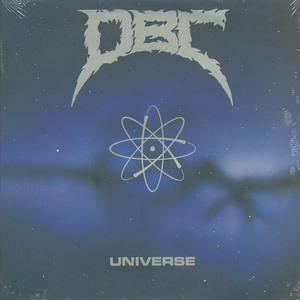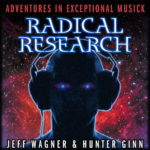
10 Sep Episode 120 – DBC’s ‘Universe’: Black Hole Spelunking

Is there an album more representative of this podcast’s main focus? Not outside of Norway, there isn’t. Montréal’s DBC (Dead Brain Cells) released ‘Universe’ in 1989, a tech-y cosmic opus of 37:26 that manages to cover the big bang, the evolution of life, the fall of the dinosaurs, man’s eventual dominance on Earth, and humanity’s possible future in the album’s brief but eventful duration. Join us as we spelunk through the black holes and blocky, monolithic riffs of DBC’s second and final album…
Note I:
All Ye Who Enter: Tangents on other Canadian metal bands will happen throughout this episode. And a Swiss one, too. And time machines…and the moon…and Phil Anselmo’s Mind Over Four shirt.
Note II:
Although Hunter claims Garth Richardson (aka GGGarth) produced Helmet’s Betty, the RR fact-checking department can find no evidence that the guy was anywhere near that album. Hunter apologizes and says, “Total brain fart. It was T-Ray [Todd Ray].”
Note III:
The Radical Research Patreon page is now set up and ready for your patronage. We are offering tiered subscription levels for those who want a set-it-and-forget-it donation option. As ever, if you choose to support us, we are humbled and grateful! patreon.com/RadicalResearchPodcast
Note IV:
All past Radical Research episodes can be found here, where you can also find Jeff’s Peter Steele and Fates Warning books…and more to come soon! Radicalresearch.org
Music cited in order of appearance:
[all snippets from DBC, Universe, 1989]
“The Genesis Explosion”
“Heliosphere”
“Primordium”
“Exit the Giants”
“Rise of Man”
“Estuary”
“Humanity’s Child”
“Phobos & Deimos”
“Threshold” “Infinite Universe”
Radical Research is a conversation about the inner- and outer-reaches of rock and metal music. This podcast is conceived and conducted by Jeff Wagner and Hunter Ginn. Though we consume music in a variety of ways, we give particular privilege to the immersive, full-album listening experience. Likewise, we believe that tangible music formats help provide the richest, most rewarding immersions and that music, artwork, and song titles cooperate to produce a singular effect on the listener. Great music is worth more than we ever pay for it.

